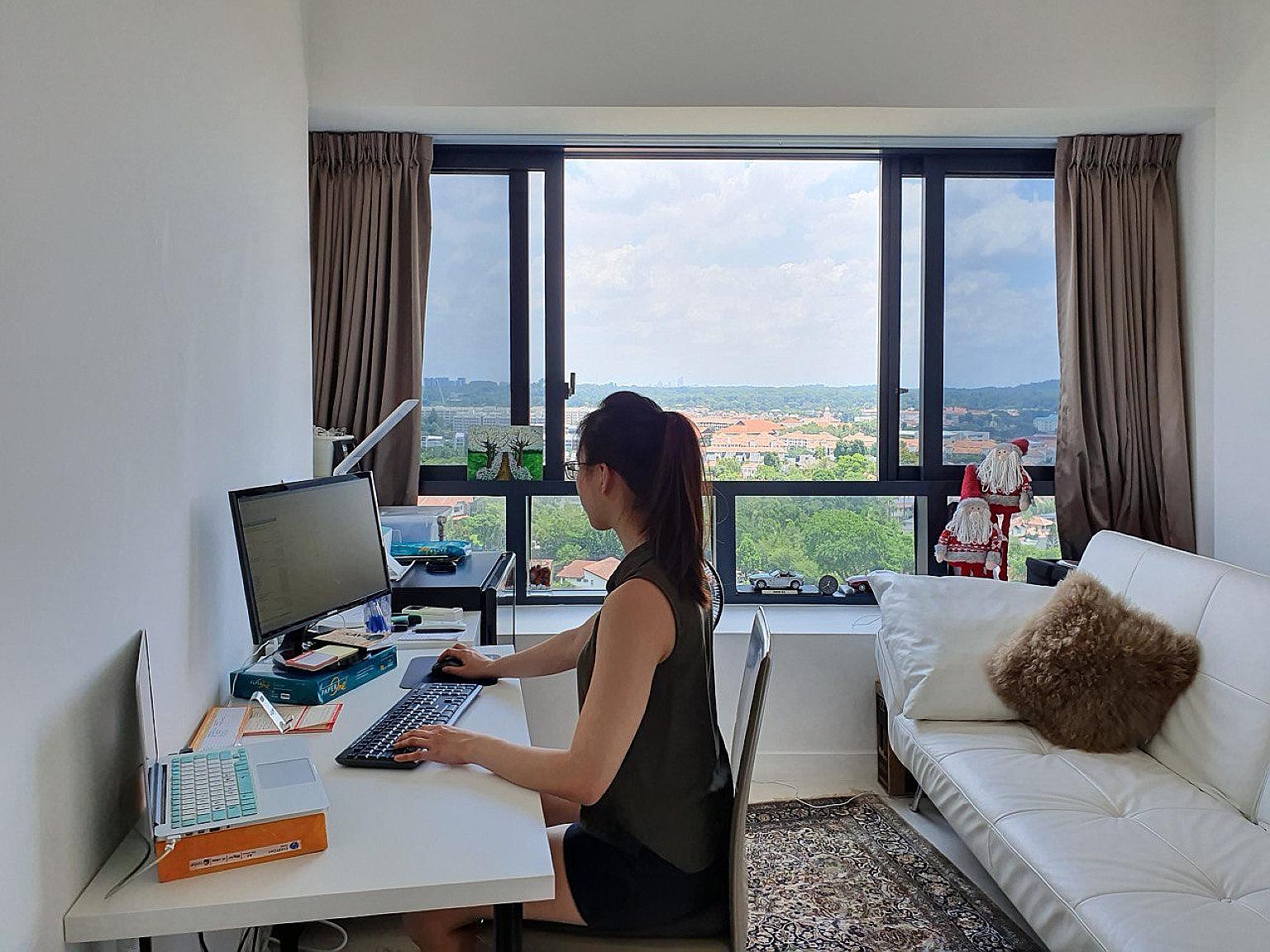Back in Singapore, but working across time zones
Some Singaporeans based overseas opt to return here due to Covid-19 situation
Sign up now: Get ST's newsletters delivered to your inbox

Ms Cheng, 24, continues to work at a global financial services firm in London from her Singapore apartment. She decided to return as she was worried about what she would do if flights home were cancelled and something happened to her family.
PHOTO: COURTESY OF MS CHENG
Financial analyst Maegan Wang is among a group of Singaporeans based overseas for their jobs who have chosen to return here due to concerns about the coronavirus situation in their foreign postings.
The 24-year-old will still have to pay state and federal taxes in the United States while she is working in Singapore, but changes to tax policies here will take some of the sting out of that.
Singaporean employees of overseas companies will not have to pay tax on their income for their stay here until Sept 30, subject to requirements. That Sept 30 end date will be reviewed as the Covid-19 situation evolves.
On top of the $600 Solidarity Payment given to all Singaporeans aged 21 and above this month, those who qualify for higher tiers of Care and Support package payments will receive a further $300 or $600 in June.
The Finance Ministry said details about the eligibility of Singaporeans working overseas for the Care and Support package payments will be released later.
For these returnees, setting up here to dovetail with colleagues overseas has not been all smooth sailing.
Ms Wang still works in US time, which means starting at 9pm and finishing in the wee hours of the morning.
"The hours don't sound great, but it's a trade-off between work and safety," she said.
Mr Mark Chng, 28, an analyst at a tech firm in London, had other concerns about coming back, such as what day-to-day work would be like and the implications for his British work visa.
He was assured by advisers at his firm that it would be all right for him to come back to Singapore to work for an extended period, after obtaining approvals from the company.
Although working during London hours - he starts work at around 3pm and ends at midnight or later - means his meal times do not line up with the usual breakfast or lunch hours in Singapore, it has been a rather smooth transition.
"There's not much practical difference between working from home in London and Singapore, it's just that my working hours are adjusted to align with the (hours in) Europe, where my projects are based," said Mr Chng.
Despite the time zone disparity, technology and modern work culture have made it possible for some to continue with the work on the other side of the world without much hiccups.
Ms Amelia Lim, 24, a consultant at management consulting firm Oliver Wyman, decided to come back to Singapore in the middle of last month after the Covid-19 situation in Britain escalated and her firm started implementing a work-from-home system.
She has been working on projects with both the firm's London and Singapore teams, an arrangement she said is possible because of the company's global staffing model, under which its staff often fly to different offices around the world to work on projects.
"It's funny because normally, our communications (between colleagues) are done over voice calls, but now that we're all working from home, people are making more of an effort to use video calls and you actually see their faces more often," she said.
A 24-year-old, who wanted to be identified only as Ms Cheng, told The Straits Times that guidelines on her tax obligations here and knowing that her British work visa would not be affected by her temporary return made it easier for her to leave London.
Ms Cheng, who works for a global financial services firm, said her decision was sparked by a question about what she would do if flights between London and Singapore were cancelled and something happened to her family.
"Above everything else, I think this Covid-19 crisis has put things in perspective - the main concerns now are not about getting a promotion or how much you're earning. Health and family come before that."
She donated her $600 Solidarity Payment to several non-profit organisations, including The Food Bank Singapore and Migrant x Me.
Other Singaporeans overseas, however, have decided to stay put.
Ms Wang said that although she returned for peace of mind, about half of her Singaporean friends working in the US stayed behind.
"Some of them work in jobs which require them to be there physically, or to be available on short notice, while family dynamics is also another concern for others," she added.


